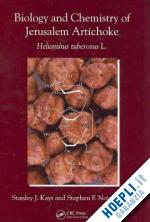A unique plant on many levels, the distinctive properties of the Jerusalem artichoke, or Helianthus tuberosus L., present novel answers to some of today's most pressing problems. The potential of Jerusalem artichoke as a source for inulin, a fructose polymer that may provide dietary health benefits for obesity, diabetes, and several other health issues and the possible use of the crop for biofuels are drawing tremendous recent interest. With its ready cultivation and minimal pest and disease problems, Jerusalem artichoke is an underutilized resource that possesses the potential to meet major health and energy challenges. A comprehensive, up-to-date reference, Biology and Chemistry of Jerusalem Artichoke presents the unique biological and chemical properties that distinguish it from other crops. Citing a diverse cross-section of references, it reviews the history, classification, morphology, and anatomy of the plant. It details inulin chemistry addressing properties and structure, extraction, and modification using microbes, enzymes, and a wide range of chemical processes. The book examines the use of Jerusalem artichokes as a biofuel and the role of inulin derived from the crop in combating obesity and diabetes, as well as promoting bone, blood, bowel, and immune health. A comprehensive chapter addresses genetic resources, breeding, breeding methods, hybridization, and the heritability of important traits. The book details developmental biology in terms of maximizing yield and determining resource allocation as well as controlling pests and disease. It concludes with practical information on agronomic methods, storage, the economics of crop production, and future prospects for utilization.Gathering a wealth of information into a single volume and drawing on the authors' 25 years of research, Biology and Chemistry of Jerusalem Artichoke provides the most comprehensive resource to date on this extremely useful crop.











